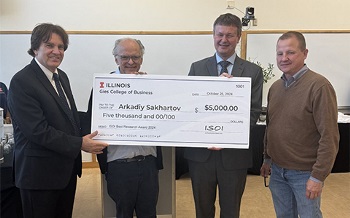Student Materials
The Auditor Independence Education Materials were developed to help students to learn about core concepts, real-world applications, and prevailing rules related to auditor independence. The student materials include:
Video – The Importance of Being Independent
The video portrays a college student, Theresa Irwin, who undertakes a video project as part of an auditing class assignment to demonstrate an understanding of the meaning and purpose of auditor independence. The video is presented in three sections, which may be viewed separately or in its entirety using the links below.
Section I – Independence 101 (Approximately 12 minutes): College student Theresa Irwin interviews a college professor. The professor analogizes the role of an independent auditor to that of a baseball umpire and then discusses how auditor independence helps our capital markets. Theresa learns about the auditor’s obligation to exercise professional skepticism and protect the public interest, and begins to research the history of the auditing profession and independence.
Video link: https://www.youtube.com/watch?v=e_cRf3qvONQ
Section II – The public accounting profession (Approximately 5 minutes): Theresa interviews a group of graduate students in the school cafeteria. These students suggest practical applications and additional analogies about independence and discuss how auditor independence in appearance is important to the public. The students also talk about the importance of obtaining a CPA license and ethics in the accounting profession.
Video link: https://www.youtube.com/watch?v=cOPz22e_28I
Section III – Independence at work (Approximately 10 minutes): Theresa visits her mother, who is a partner in a public accounting firm. She learns how independence affects auditors, both personally and professionally. She finds out that independence rules address five primary areas: (1) financial interests, (2) business relationships, (3) employment relationships, (4) scope of services, and (5) fee arrangements. Her mother introduces each area and provides examples. In the final scene, Theresa summarizes what she has learned throughout her video adventure (sections I-III) about the importance of being independent.
Video link: https://www.youtube.com/watch?v=XCygEhsWPWs
Video Discussion Questions
The below links provide discussion questions which accompany the video. These discussion questions further expand on the topics discussed in the video, however, can be answered without viewing the video. Click on the links below to access the discussion questions to each section of the video.
Discussion Questions Related to Section I – Independence 101 The discussion questions in this section focus on the public interest, professional skepticism, financial statement users, and independence in fact and appearance.
Discussion Questions Related to Section II – The public accounting profession The discussion questions in this section focus on professionalism, professions, and independence in appearance.
Discussion Questions Related to Section III – Independence at work The discussion questions in this section focus on personal independence, application of independence rules, and five primary areas of independence.
To view the video in its entirety, please visit https://www.youtube.com/watch?v=dczf3esWdyI
Case Studies
The case studies will introduce you to independence by describing a public accounting firm’s audit relationship with a company – from the firm’s proposal to become the company’s auditor to its ongoing audit relationship. The case studies explore five areas of auditor independence described in section III of the video: 1) financial interests, 2) business relationships, 3) employment relationships, 4) scope of services, and 5) fee arrangements. There are five case studies all consisting of simple rule-based, complex rule-based, and conceptual questions. See below for the links and short descriptions of each of the case studies.
Case Study 1: Can we propose? You will evaluate relationships between the public accounting firm and the client, and determine whether the public accounting firm is independent and may propose to perform the client’s audit.
Case Study 2: The independence alert The public accounting firm communicates the new engagement to its professionals and as a result, several professionals identify possible independence issues, which you must evaluate for compliance with independence.
Case Study 3: Assembling the audit team You will evaluate potential audit team members’ financial interests and business and employment relationships with the client to determine whether they are independent.
Case Study 4: Communications with the audit committee and independence exceptions You will prepare for a meeting with the client’s audit committee to discuss the public accounting firm’s independence, including relationships and services that may affect the firm’s independence. In addition, you will review independence exceptions and the related consequences.
Case Study 5: The client wants to hire me In this case study you learn that an audit team member was considering employment with the client and must determine an appropriate course of action. The consequences of impaired independence are also explored.
Student Handout
In the handout you will assess whether you believe certain auditor characteristics are correlated with an auditor’s tendency to acquiesce to the client management’s preferences. Click here to access the Student Handout
Disclaimer: The Auditor Independence Educational Materials (the “Materials”) are provided as an educational tool by Deloitte & Touche LLP (“Deloitte & Touche”). The purpose of the Materials is to inform and educate students about auditor independence and various auditor independence viewpoints. Deloitte & Touche does not endorse the views expressed or the academic research cited in the Materials. The Materials do not address all possible fact patterns and the guidance and rules presented are subject to change. All situations presented are hypothetical and suggested solutions and teaching notes do not represent Deloitte & Touche’s conclusions on any specific independence matter or situation. Deloitte & Touche is not, by means of the Materials, rendering accounting, business, financial, investment, legal, tax, or other professional advice or services. The nonexclusive right to reproduce these Materials without explicit written permission is hereby granted to faculty in connection with classroom use, academic research, and other educational endeavors of a not-for-profit nature.




